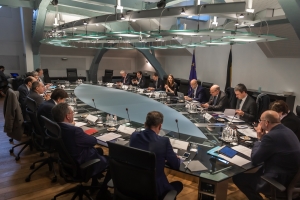Coronavirus: Phase 2 maintained, transition to federal phase and additional measures
As announced on March 10, the evolution of the spread of the coronavirus is assessed every day, as the situation is constantly changing. In light of the most recent developments, the National Security Council met on Thursday 12 March in the presence of and in consultation with the Ministers-President. This meeting of the NSC followed on from the meetings of the expert groups, namely the Risk Assessment Group and the Risk Management Group.
The decision was to reinforce the current measures with additional social distancing measures aimed at the same objective: to prevent the epidemic from spreading. These measures are proportionate and aimed at maximum efficiency. From an operational point of view, we are now entering the federal phase of crisis management, which means that all decisions will be taken by a management team comprised of the Prime Minister, the competent ministers and the Ministers-President. This phase ensures better coordination and information on the measures taken by the various entities. The measures announced will apply throughout the country.
All levels of authority share the same commitment to coordinated action, communication and implementation for the measures decided. We want the same decision to be applied consistently throughout the country. The primary objective is to protect public health.
These measures are in effect from Friday midnight until 3 April. As before, the ongoing situation will be assessed on a daily basis.
Regarding schools:
- Regarding schools, all lessons are suspended. Childcare will be organised, especially for children of medical and healthcare staff and staff working in safety and security roles (public safety and security). If the only childcare that is available for children involves elderly persons, these children will also be able to go to the schools.
- Nurseries will remain open.
- For universities and colleges of higher education, the recommendation is to develop remote learning modules. These schools will not be closed, but are encouraged to provide alternatives to traditional courses in lecture halls or in confined spaces;
Regarding commercial and recreational activities (sports, culture, folklore, etc.):
- All activities are cancelled, regardless of the size of the event and whether they are public or private.
- Discos, bars and restaurants, among other locations, remain closed;
- Hotels will remain open, except for their restaurant;
- Home delivery and drive-in are allowed;
- Shops will be open during the week, but not on weekends;
- Food stores and pharmacies will be open, even on weekends. However, they are advised to step up hygiene measures following the recommendations already made.
Regarding work:
- Everyone should keep working as much as possible, but working from home should be encouraged and, if necessary, reinforced.
Regarding public transport:
- Public transport will continue to function normally, but trips should be limited to only those that are necessary. Flexible working times should prevent overloading public transport.
Please note that these measures complement the recommendations already made. The reinforced phase two continues to apply.
We are well aware that these decisions will impact the economy, and certain industries in particular.
In this respect, on 6 March, the Council of Ministers had adopted ten measures in support of business, namely:
- Temporary unemployment due to force majeure
- Temporary unemployment for economic reasons
- Payment plan for employers' social security contributions
- Payment plan for VAT
- Payment plan for withholding tax
- Payment plan for personal income tax/corporate tax
- Reduction of tax prepayment for self-employed persons
- Postponement of or exemption from payment of social security contributions for self-employed workers
- Entitlement to replacement income for self-employed persons (droit passerelle/overbruggingsrecht/bridging right)
- Flexibility in the performance of federal government contracts
These measures will be constantly monitored, with a view to strengthening them where necessary.
Finally, we would like to remind you that basic hygiene measures still apply, i.e. washing hands with soap, coughing and sneezing into your elbow and avoiding close contact. If you have the slightest doubt, consult your physician. Everyone should do their part to limit the spread of the virus.
The following telephone numbers are available to all citizens who have questions:
- For questions concerning health and public order: 0800/14.689
- For questions about the economy: 0800/120.33

